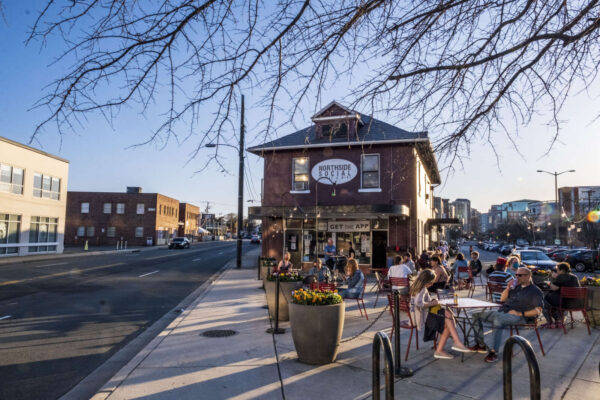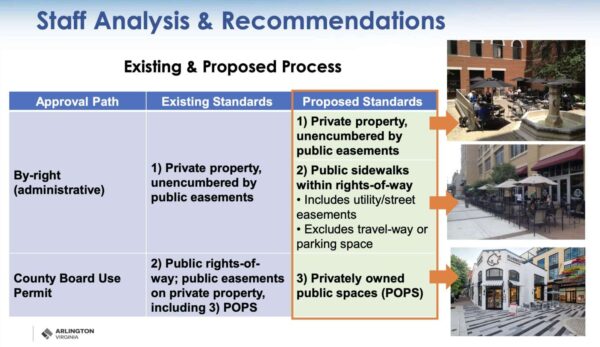
The makeshift outdoor dining areas that sprung up in the early days of Covid, and gradually took on a more permanent feel, could be here to stay.
On Tuesday, the Arlington County Board voted to hold hearings next month mulling zoning changes that would give most restaurants a way to add outdoor seating areas without special Board approval.
Restaurants were able to do this during the pandemic — adapting to social distancing and indoor gathering regulations — via a special county program that is ending on Aug. 15.
Under the proposed ordinances, temporary outdoor seating areas (TOSAs) that are on private property and on public sidewalks within rights-of-way would be approved administratively. Those on privately owned public spaces, like the patio outside the seafood spot Seamore’s in Clarendon, would require a County Board use permit.

Restaurants could go to the Board to have parking spots converted to outdoor dining space.
The proposed ordinance changes, which will be discussed in a Board meeting on July 15, have been under development for the last year. The county says the code changes support local businesses, about 100 of which have TOSAs, and account for livability concerns some residents raised.
“This is a huge body of work. A huge thanks to staff, who’ve been working on this comprehensively for a while,” Board Chair Christian Dorsey said. “I know it seems like a simple issue to some, but as you peel layers of the onion, you continue to find more complexity.”
The Board initially approved TOSAs early in the pandemic to help restaurants circumvent the typically lengthy process for getting an outdoor dining permit. These spaces were popular for offsetting revenue lost to closures and social distancing and for creating a safer dining experience.
As the pandemic wore on, the Board allowed TOSAs in common areas, such as plazas, and for restaurants to continue operating them at full capacity once the indoor capacity restrictions lifted.
“It was a life saver for our family and employees and continues to be a large part of our business,” Lebanese Taverna Executive Vice President Grace Shea said during a forum hosted by the Arlington Committee of 100 on Wednesday night.
Now, she says, it brings more people to the restaurant.
“Outdoor seating enhances the streetscape of where the restaurant is. It attracts people by creating a welcoming atmosphere,” she said. “It’s also additional revenue that we do not have to pay rent for.”
In 2021, Arlington County signaled plans to study early a dozen separate policies governing outdoor cafés to figure out how to make TOSAs permanent. That started in the fall of 2022, after a local Covid emergency order ended.
County staff say it heard both support and concerns from the community. One strong supporter is the Arlington Chamber of Commerce.
“The Chamber and the county both agree that we want to make this transition smooth for restaurant owners who want this outdoor dining,” said John Musso, the government affairs manager for the Chamber, at Wednesday’s forum. “We’re looking forward to continuing this conversation.”
Musso and a resident, Ethan Kearns, addressed the Board on Tuesday.
Kearns told the Board his family townhome, off Langston Blvd, is 27 feet from a restaurant. Once it set up a TOSA, he says it was used for events with loud music and speakers with microphones, keeping his young children up at night. People urinated on his property, cursed loudly during sports events and took open alcohol containers off-site.
“You can see the friction points,” he said. “None of these things we listed here we had to deal with before the TOSA and we’ve lived here since 2009.”
Kearns supported elements of the ordinance because it prohibits outdoor audio-video entertainment at TOSAs in a side or rear yard abutting low-density residential areas. He also suggested adding a way for neighbors and restaurants to better address their differences.
In a letter, the county’s Pedestrian Advisory Committee says it supports helping restaurants survive and making streets more vibrant but disagrees with specific elements of the county’s proposal. It says it relies too heavily on letting restaurants take over sidewalks, which especially impacts people with disabilities.
“We are disappointed that the proposal takes away only from pedestrian space as it looks at where to place outdoor cafés, and does nothing to use the areas outside the sidewalk to meet this demand,” said Pedestrian Advisory Committee Chair Elizabeth Gallagher.
If the Board approves the changes next month, county staff will begin in-person, direct engagement with restaurants with TOSAs. Interested restaurants should apply by Aug. 15.
Come August, restaurants will be able to maintain their current TOSAs so long as they demonstrate a good-faith effort to apply for new permits, says county attorney MinhChau Corr.
Musso said the Chamber is heartened that the county will be reaching out to affected restaurants and potentially providing individualized recommendations for their next steps.
“The Chamber is more than happy to assist the county in getting this information disseminated out in a timely and efficient manner,” he said.
Hallie LeTendre contributed to this report

